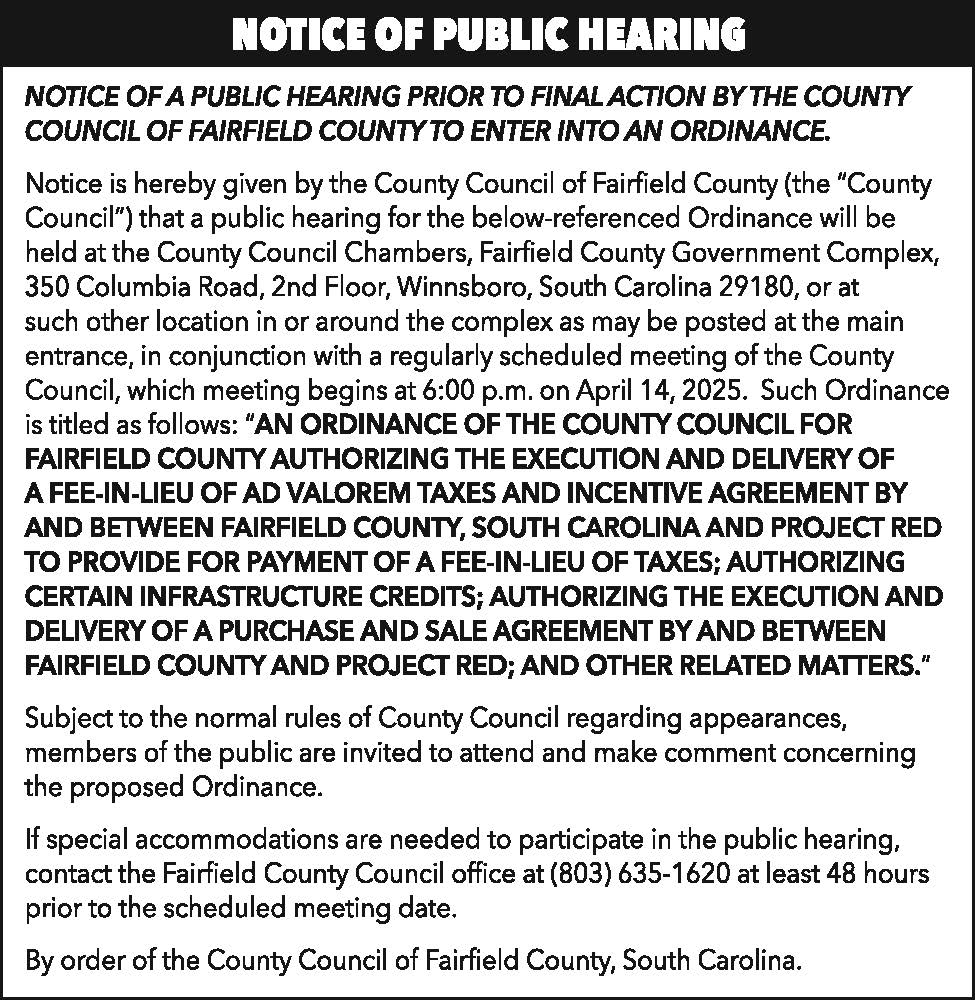COLUMBIA – A court ruling handed down March 2 granted Town of Blythewood council members a temporary and permanent injunction that prohibits Blythewood Mayor Sloan Griffin from enforcing an executive order issued by him that would allow him to hire town hall employees without town council authorizing funding for those positions.
The injunction was filed by Mayor Pro Tem Donald Brock, and Council members Rich McKenrick, Andrea Fripp, and Erica Page.
The order, issued by Judge Daniel Coble in the Richland County Court of Common Pleas, states that after carefully considering arguments of counsel, applicable law, and filings of the parties, the court rules that defendant Griffin is enjoined from enforcing the provisions of his Executive Order No. 3.
“Provisions 1-3 of the Mayor’s executive order requires council to reinstate certain employees, provide backpay, and allocate funds. These provisions,” Judge Coble stated, “are outside of the authority of the mayor and usurp the powers of the council based on S.C. Code §§ 5-9-30 and 5-9-40. The budget that the Mayor is attempting to reinstate was amended by Ordinance 2024.009.
“This Ordinance has not been challenged and therefore is proper until a court states otherwise,” the ruling states. “The mayor does not have 1) the judicial authority to declare the amended budget invalid; 2) the legislative power to create a new budget; or 3) the executive power to enforce validity of a new budget.
“The Mayor does have the ability to challenge the amended budget in Circuit Court if he believes it has illegally defunded his office,” the order states.
Judge Coble heard the Motion in person on Feb. 24, 2025. Present at the hearing were counsel for the Town’s four council members, James Bradley, and counsel for Griffin, Austin Nichols, as well as the four Blythewood town council members who filed the order. Griffin was not present.
In a letter to Judge Daniel Coble, Bradley stated that the dispute regards the municipal authority of the mayor in ultra vires acts – acts that require legal authority but are done without it.
In an affidavit submitted to the Court, Griffin claimed that his proposed staffing positions are critical to ensuring the Town can meet increased demand for services, maintain public safety, and support a growing economy while preserving the quality of life for residents.
Bradley argued in a responding affidavit that the eliminations of the positions does not compromise the Town’s operational efficiency. He stated that the Town does not have a public safety department and does not provide any essential services to the community such as utilities, emergency medical services, fire services, or police services.
“These services are provided by other entities, specifically Richland County, in most instances,” the affidavit states. “The Town is perfectly well functioning with the current employees in their current positions.”
In December, 2024, Griffin announced that he had hired two employees for whom he had created two positions – a deputy administrator and a social media specialist – without discussing either position or either hire with any members of council. Neither position had been funded by council.
After it was reported by The Voice that Griffin’s newly hired deputy administrator is under criminal investigation by the South Carolina Law Enforcement Division, Griffin announced that the new hire decided not to pursue the job.
Council then removed funding in the budget for all unfilled positions, stipulating that funding for new positions would have to be approved by council. Griffin requested a S.C. Attorney General’s opinion concerning the mayor’s authority to hire employees without council’s consent. The AG responded that while the mayor in a mayor/council form of government has the authority to hire employees without permission from council, section 5-9-40 of state law places the responsibility of adopting a municipal budget with the council, and that the mayor is prohibited from expending funds not appropriated by council.
“While it is true that the council exercises totally the budgetary authority of the municipal government and, consequently, can increase, decrease or otherwise alter appropriations for specific municipal officers and functions [§ 5-7-216], nevertheless, it cannot so decrease the appropriations of an elected official’s office so as to prevent its proper functioning and, thus, indirectly, to abolish that official’s office,” the S.C. Attorney General’s office opined in a 1979 case.
“Provision 4 of the Mayor’s Executive Order No. 3 creates three new part-time positions. While the Mayor does have authority under S.C. Code § 5-9-30 to ‘appoint’ employees, that authority is restricted by Council’s budgetary authority under S.C. Code § 5-9-40,” Judge Coble’s order stated.
“The Mayor and Council have separate legal authority, yet this form of government [mayor/council] still anticipates that the powers of the two branches will cross over in order to have a functioning and workable government. However, based on the testimony and affidavits provided by [the four members of town council and the mayor], the Council has not so interfered with the Mayor’s duties as to make Provision 4 appropriate,” the order states.
The prevailing party is charged with providing a more formal order within ten days.











